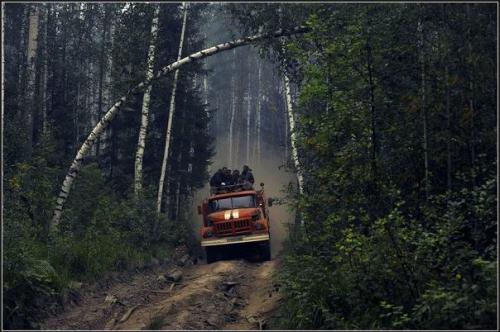
Yes, that's an American bike he's riding. Prime Minister Vladimir Putin steering a Harley-Davidson Lehman Trike on July 24 as he arrives for a meeting with Russian and Ukrainian bikers in Ukraine's Crimea region. Photo courtsey fo the Moscow Times.
Hero journalist Yulia Latynina, writing in the Moscow Times:
The Shatursky district has the distinction of being one of the few areas in the Moscow region where not a single home or person suffered from the fires, despite the fact that the area had more dried-out peat bogs — and was thus more fire-prone — than other districts in the region.
Shatursky was spared largely because Andrei Keller, the district’s head, was one of the few administrative chiefs who took preventative measures and moved quickly and decisively when the fires broke out. Amazingly, 1,051 fires had been spotted in the district since April, yet not one of them ever spread beyond 20 hectares to 26 hectares in size. What’s more, Keller declared a state of emergency in the district as early as June 22.
This is a good illustration that in the modern world, there are no natural disasters — only social ones.




 People have begun to take Russia seriously. In 2005, immediately after signing the agreement on building the North Stream pipeline, we announced that we now possessed an energy weapon. “Not to worry, it’s just words,” Europe responded. But the Kremlin has since then actually used the weapon.
People have begun to take Russia seriously. In 2005, immediately after signing the agreement on building the North Stream pipeline, we announced that we now possessed an energy weapon. “Not to worry, it’s just words,” Europe responded. But the Kremlin has since then actually used the weapon.